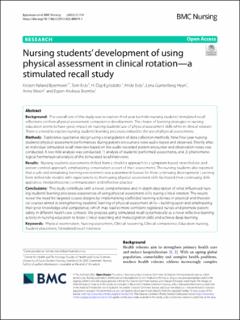| dc.contributor.author | Byermoen, Kirsten Røland | |
| dc.contributor.author | Eide, Tom | |
| dc.contributor.author | Egilsdottir, H. Ösp | |
| dc.contributor.author | Eide, Hilde | |
| dc.contributor.author | Heyn, Lena | |
| dc.contributor.author | Moen, Anne | |
| dc.contributor.author | Brembo, Espen Andreas | |
| dc.date.accessioned | 2023-03-23T11:37:51Z | |
| dc.date.available | 2023-03-23T11:37:51Z | |
| dc.date.created | 2022-05-10T11:31:40Z | |
| dc.date.issued | 2022 | |
| dc.identifier.citation | Byermoen, K. R., Eide, T., Egilsdottir, H. Ö., Eide, H., Heyn, L. G., Moen, A. & Brembo, E. A. (2022). Nursing students’ development of using physical assessment in clinical rotation—a stimulated recall study. BMC Nursing, 21(1), Artikkel 110. | en_US |
| dc.identifier.issn | 1472-6955 | |
| dc.identifier.uri | https://hdl.handle.net/11250/3060095 | |
| dc.description.abstract | Background: The overall aim of this study was to explore third-year bachelor nursing students’ stimulated recall reflections on their physical assessment competence development. The choice of learning strategies in nursing education seems to have great impact on nursing students’ use of physical assessment skills while in clinical rotation. There is a need to explore nursing students’ learning processes related to the use of physical assessments.
Methods: Explorative qualitative design using a triangulation of data collection methods. Nine final-year nursing students’ physical assessment performances during patient encounters were audio-taped and observed. Shortly after, an individual stimulated recall interview based on the audio-recorded patient encounter and observation notes was conducted. A two-fold analysis was conducted: 1) analysis of students’ performed assessments, and 2) phenomenological hermeneutical analysis of the stimulated recall interviews.
Results: Nursing students assessments shifted from a checklist approach to a symptom-based, more holistic and person-centred approach, emphasizing conversation as part of their assessments. The nursing students also reported that a safe and stimulating learning environment was a prominent feature for their continuing development. Learning from skilled role models with expectations to them using physical assessment skills facilitated their continuing skills appliance, interprofessional communication and reflective practice.
Conclusions: This study contribute with a novel, comprehensive and in-depth description of what influenced nursing students’ learning processes experiences of using physical assessment skills during clinical rotation. The results reveal the need for targeted course designs by implementing scaffolded learning activities in practical and theoretical courses aimed at strengthening students’ learning of physical assessment skills—building upon and emphasizing their prior knowledge and competence, which may lead to more confident registered nurses and promote patient safety in different health care contexts. We propose using stimulated recall systematically as a novel reflective learning activity in nursing education to foster clinical reasoning and metacognition skills and achieve deep learning. | en_US |
| dc.language.iso | eng | en_US |
| dc.rights | Navngivelse 4.0 Internasjonal | * |
| dc.rights.uri | http://creativecommons.org/licenses/by/4.0/deed.no | * |
| dc.title | Nursing students’ development of using physical assessment in clinical rotation—a stimulated recall study | en_US |
| dc.title.alternative | Nursing students’ development of using physical assessment in clinical rotation—a stimulated recall study | en_US |
| dc.type | Journal article | en_US |
| dc.type | Peer reviewed | en_US |
| dc.description.version | publishedVersion | en_US |
| dc.rights.holder | © The Author(s) 2022. | en_US |
| dc.source.pagenumber | 1-17 | en_US |
| dc.source.volume | 21 | en_US |
| dc.source.journal | BMC Nursing | en_US |
| dc.source.issue | 1 | en_US |
| dc.identifier.doi | https://doi.org/10.1186/s12912-022-00879-1 | |
| dc.identifier.cristin | 2023021 | |
| dc.source.articlenumber | 110 | en_US |
| cristin.ispublished | true | |
| cristin.fulltext | original | |
| cristin.qualitycode | 1 | |

